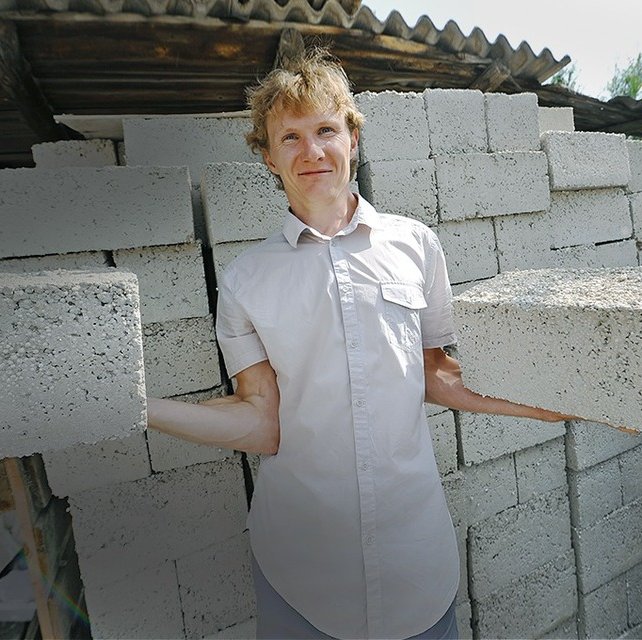Waste Production

After the end of the vase in 2003, the Volgograde Roman Sebequin was burned by the idea of building houses from a recycled plastic. He traveled half the country to find appropriate technologies, purchased used equipment and registered
USO-Peering. In the crisis, his blocks, which are twice as cheap as usual, have become popular with private house builders. The company ' s monthly turnover is now 350,000 roubles.
(Signed) Roman SEBEKIN
Founder of the USO-Percew
How it started.
When I was a kid, I saw two ways: either working for the state or myself. First, I chose the first path. After school, he went to the Volgograd branch of the Academy of Public Service and wanted to work in the Directorate of Tax Offences. I thought it was a very interesting and promising direction. But after a few internships at the tax police, it was disappointing. I didn't like it. In the end, I left my dream and decided to get a second higher education, and I went to law school. But by the end of school, I realized I wouldn't be a lawyer. I got the idea of building a house, including a recycled plastic.
I've read a lot about these technologies, I've seen foreign companies specializing in recycling of garbage and subsequent construction. It was 2003. There was no ready technology at the time, and I had very little money. But Volgograd is an industrial city. You can build a tank here, but you need to know how to collect it. I started thinking about technology and equipment, and I started driving around Russia looking for materials and work, studying production. Frequently, there was a need for sampling and error. Start capital was very small. Something I earned myself, something my mom helped. About $1,000, I spent on used equipment, which then completely changed. As a result, he put some 100,000 roubles in the case. There was a lot of effort and time to start the company, but it did. In 2004, I registered the firm.
Related posts:
 In the Volgograd Region Administration, a concession agreement was signed on public utilities, recycling, disposal (storage) of solid household waste. According…
In the Volgograd Region Administration, a concession agreement was signed on public utilities, recycling, disposal (storage) of solid household waste. According… The building is already over, and a bunch of building debris and waste remains lying, rather than seriously ruining the type of capital. As a result, today the required…
The building is already over, and a bunch of building debris and waste remains lying, rather than seriously ruining the type of capital. As a result, today the required… I ve done a lot of franchise monitors, but I ve got the usual bids, a cafe or a store that s already starting to compete with me, I thought I was bored, telling…
I ve done a lot of franchise monitors, but I ve got the usual bids, a cafe or a store that s already starting to compete with me, I thought I was bored, telling… What are the rules for sorting debris on French Riviera? When we rented an apartment in Paris, there were a few large tanks in the interior courtyard where classic…
What are the rules for sorting debris on French Riviera? When we rented an apartment in Paris, there were a few large tanks in the interior courtyard where classic… Is discipline important in investing? Without any doubt it is true! A disciplined investor will never buy securities without serious analysis or pay attention to…
Is discipline important in investing? Without any doubt it is true! A disciplined investor will never buy securities without serious analysis or pay attention to… Structural debris: brick, brisket, concrete, stoves obtained during the dismantling of construction sites are transformed into a secondary building block on GOST…
Structural debris: brick, brisket, concrete, stoves obtained during the dismantling of construction sites are transformed into a secondary building block on GOST… Professional presentation demands more than just content - it requires the right display platform. The Black Easel stands out as a sophisticated solution for artists…
Professional presentation demands more than just content - it requires the right display platform. The Black Easel stands out as a sophisticated solution for artists… By 2015, equipped reception and recycling facilities should be established in the five administrative districts of Moscow. They ll be set up by private companies…
By 2015, equipped reception and recycling facilities should be established in the five administrative districts of Moscow. They ll be set up by private companies… The Territorial Waste Management Scheme was held by the Parliamentary Hearings at Medoldum Parliamentary hearings of the Regional Waste Management Scheme were held…
The Territorial Waste Management Scheme was held by the Parliamentary Hearings at Medoldum Parliamentary hearings of the Regional Waste Management Scheme were held… Environmentally sound behaviour is very often consistent with the principles of rationality, servitude, prudential treatment of purchases, by their time, to environmental…
Environmentally sound behaviour is very often consistent with the principles of rationality, servitude, prudential treatment of purchases, by their time, to environmental…